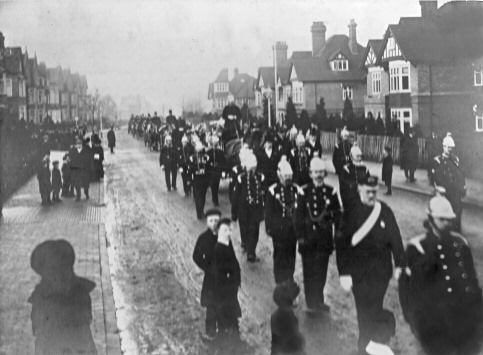A PROTECTIONIST
Whilst alluding to Mr. Wilmot's political career, it should be mentioned that he was a persistent and consistent Protectionist.
Long before Mr. Chamberlain's Tariff reform movement became as popular as it is, even indeed, when Mr. Chaplin, Mr. Lowther, and one or two officers were the only open advocates in the House of Commons, Mr. Wilmot never hesitated to advocate the principle.
It was curious that being such a Radical in some respects - and he sometimes expressed opinions and advocated measures which were often ultra Radical - he should be found advocating views which, up to recently at all events were looked upon as representing old -fashioned Toryism.
However, there it was.
He was not, in our opinion, a good debater on the subject - he was too prone to evade the main question, and to indulge in generalities or points of detail.
However he had a very attractive style, and being, to use a familiar phrase, "an old Parliamentary hand," he could quickly extricate himself out of any difficulty in which he might find himself, his pleasant personality and control of temper often standing him in good stead.
A short time back he was appointed Organising Secretary of the Tariff Reform League for Kent and Sussex, and no man could have been found better fitted for the post.
He not only organized, but spoke at a large number of meetings, and was generally indefatigable in prosecuting a campaign which was so near to his own heart.
It will be indeed be very difficult, nay, an impossible, matter to find a successor who can, in some respects, fill the post with anything like such success.
|
| |
|
A FREEMASON
In the craft of Freemasonry, Bro. Wilmot took the greatest possible interest, which was maintained to the last.
The philanthropical objects of the craft, as well, so to speak, as it's ornate side, strongly appealed to a temperament fond of dignity and display, and no one consequently could be fonder of an Order which at one and the same time preaches good will towards all men, is founded on a democratic basis, and gives it's disciples the opportunity to fill the most prominent and coveted positions.
We do not know how long he had been a member of the brotherhood, but it must have been over thirty years, for at least twenty-six years ago he was then a Past Master of the Holmesdale Lodge.
The first W. M. of the Lodge, by the way, was Mr. F. W. Elers. The second Mr F. W. Stone, the third Mr. G. Langridge. and Mr. Wilmot became the fourth.
He was also a Past Provincial Grand Registrar of Kent (1879), and thus gained the coveted "Purple," which was conferred upon him by Lord Amherst, Provincial Grand Master of Kent.
He was one of the founders of the Pantiles Lodge (2,200), and was appointed the first Immediate Past Master of the Lodge when it was consecrated, the Town Clerk, Mr. W. C. Cripps being the Worshipful Master.
Bro. Wilmot afterwards acted as director of Ceremonies at the installations for several years, as well as at the Holmesdale Lodge.
He was also connected with other Masonic institutions, attended Grand Lodge and Provincial Grand Charity meetings, and hence he became the proud possessor of a large number of medals and jewels.
|
|
